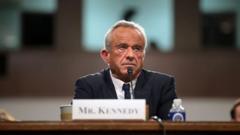In a highly polarized confirmation hearing held Wednesday, Robert F. Kennedy Jr., the controversial nominee for US health secretary, faced sharp questioning from Senate members regarding his past vaccine statements, views on abortion, and criticism of the US food industry. The event was marked by protests, but Kennedy also garnered applause for promises to enhance America's health.
Robert F. Kennedy Jr. Faces Scrutiny at First Confirmation Hearing as Health Secretary Nominee

Robert F. Kennedy Jr. Faces Scrutiny at First Confirmation Hearing as Health Secretary Nominee
Robert F. Kennedy Jr. navigates intense questioning during his confirmation hearing for US Health Secretary, addressing vaccine skepticism, abortion, nutrition, and more.
Kennedy's history as a vaccine skeptic dominated discussions, as senators confronted his remarks questioning the safety and efficacy of immunizations. He defended his stance, asserting that he is not anti-vaccine and calls for more rigorous safety studies. Despite his claims, senators highlighted context from his past interviews where he expressed concerns over vaccine safety.
In addition to vaccine discussions, Kennedy emphasized the significance of nutrition in combating chronic diseases. He pledged to investigate chemical additives in food products and advocate for public health improvements without restricting access to processed foods. He acknowledged the obesity epidemic and committed to reversing it.
The abortion debate surfaced as Kennedy shifted his position, agreeing with President Trump’s focus on state control over abortion rights while asserting that he regards each abortion as tragic. Senators expressed concern about his apparent change in views for political alignment.
Senator Bernie Sanders challenged Kennedy on health care as a human right, prompting Kennedy to talk about health care accessibility in contexts of personal responsibility. Republicans praised Kennedy's focus on chronic disease prevention, while Democrats scrutinized him over misinformation and public health trusts.
Kennedy’s performance leaves him with further challenges, as he is set for another hearing in the finance committee, demonstrating the contentious nature of his nomination process ahead of a final vote in the Senate.
In addition to vaccine discussions, Kennedy emphasized the significance of nutrition in combating chronic diseases. He pledged to investigate chemical additives in food products and advocate for public health improvements without restricting access to processed foods. He acknowledged the obesity epidemic and committed to reversing it.
The abortion debate surfaced as Kennedy shifted his position, agreeing with President Trump’s focus on state control over abortion rights while asserting that he regards each abortion as tragic. Senators expressed concern about his apparent change in views for political alignment.
Senator Bernie Sanders challenged Kennedy on health care as a human right, prompting Kennedy to talk about health care accessibility in contexts of personal responsibility. Republicans praised Kennedy's focus on chronic disease prevention, while Democrats scrutinized him over misinformation and public health trusts.
Kennedy’s performance leaves him with further challenges, as he is set for another hearing in the finance committee, demonstrating the contentious nature of his nomination process ahead of a final vote in the Senate.





















